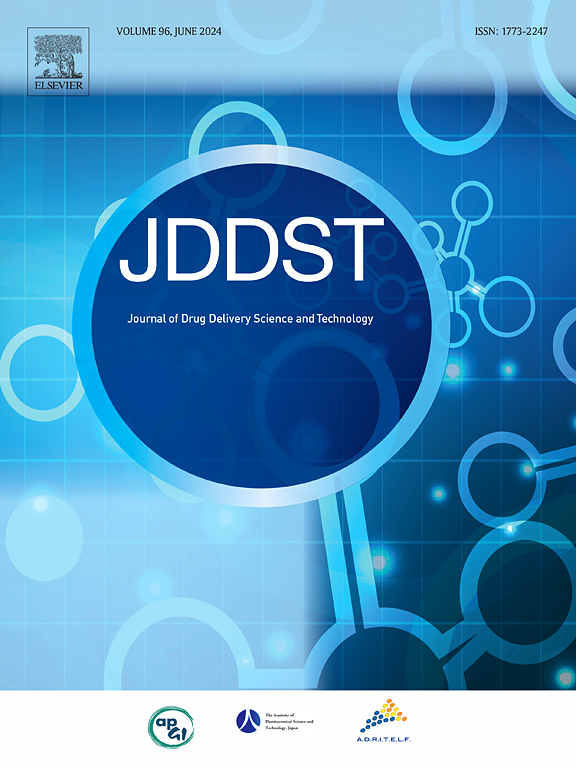革命性胰腺癌治疗的综合综述:脂质体创新
IF 4.5
3区 医学
Q1 PHARMACOLOGY & PHARMACY
Journal of Drug Delivery Science and Technology
Pub Date : 2025-05-16
DOI:10.1016/j.jddst.2025.107032
引用次数: 0
摘要
胰腺癌是一种预后差、治疗效果有限的致死性疾病。大约90%的胰腺肿瘤被归类为胰腺导管腺癌(PDAC),使其成为最常见的PC类型。PC有多种常规治疗方法,如手术、化疗、放射动力治疗、光疗和辅助护理。尽管它们得到了利用,但它们的有效性受到一些缺陷的限制,如毒性、对治疗的耐药性和对健康组织的损伤。脂质体已成为一种有前途的解决方案,以提高各种化疗药物对PC的治疗效果。各种脂质体,包括peg包被、ph敏感、热敏、酶反应、超声敏感、配体靶向和磁性脂质体,在临床前研究中显示出巨大的潜力。虽然各种临床试验进行的脂质体制剂,他们揭示了治疗潜力的脂质体的临床效用。还研究了专利景观,以深入了解研究领域的进展和改进。总之,脂质体通过包裹亲脂性和亲水性药物来增强药物的递送,具有靶向递送到肿瘤部位,提高生物利用度,减少不良反应,克服耐药性,提高治疗效果的巨大潜力。这篇综述强调了脂质体通过靶向递送、减少脱靶效应和提高治疗效果来改变PC治疗的潜力,从而改善患者的预后。本文章由计算机程序翻译,如有差异,请以英文原文为准。
A comprehensive review on revolutionizing pancreatic cancer Treatment: Liposomal innovations
Pancreatic cancer (PC) is a lethal disease characterized by a poor prognosis and limited treatment efficacy. Approximately 90 % of pancreatic tumors are classified as pancreatic ductal adenocarcinoma (PDAC), making it the most prevalent type of PC. Various conventional treatments are available for PC, such as surgery, chemotherapy, radiodynamictherapy, phototherapy and supportive care. Despite their utilization, their effectiveness is limited by several drawbacks such as toxicity, resistance to treatment, and damage to healthy tissues. Liposomes have emerged as a promising solution to enhance the therapeutic effectivenessof various chemotherapeutic agents for PC. Various liposomes, including PEG-coated, pH-sensitive, thermosensitive, enzyme-responsive, ultrasound-sensitive, ligand-targeted, and magnetic liposomes, have demonstrated great potential in preclinical studies. Although various clinical trials are conducted on liposomal formulations, they reveal the therapeutic potential of liposomes for clinical utility. The patent landscape is also studied to get insights into advancements and improvements in the research area. Overall, the liposomes have great potential to enhancethe delivery of drugs by encapsulating both lipophilic and hydrophilic drugs, possessing targeted delivery to tumor sites, offering improvement in bioavailability, reducing adverse effects, overcoming drug resistance, and enhancing the therapeutic outcomes. This review highlights the potential of liposomes to transform PC therapy by enabling target delivery, reducing off-target effects, and enhancing therapeutic efficacy to improve patient outcomes.
求助全文
通过发布文献求助,成功后即可免费获取论文全文。
去求助
来源期刊
CiteScore
8.00
自引率
8.00%
发文量
879
审稿时长
94 days
期刊介绍:
The Journal of Drug Delivery Science and Technology is an international journal devoted to drug delivery and pharmaceutical technology. The journal covers all innovative aspects of all pharmaceutical dosage forms and the most advanced research on controlled release, bioavailability and drug absorption, nanomedicines, gene delivery, tissue engineering, etc. Hot topics, related to manufacturing processes and quality control, are also welcomed.

 求助内容:
求助内容: 应助结果提醒方式:
应助结果提醒方式:


